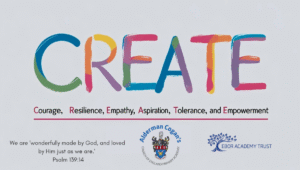Christian Values
“Christian values promote peace and good will among people in accordance with the purposes of God.”

Our Christian Values form the acronym ‘CREATE’:
Courage
Philippians 4:13: “I can do all this through him who gives me strength.”
Courage is a crucial Christian value for our school because it’s a foundation for living out other Christian virtues. It’s not just about bravery in the face of physical danger but about having the moral and spiritual strength to do what’s right, even when it’s hard.
The life of Jesus provides the ultimate example of courage. He demonstrated immense courage in confronting injustice, healing the sick, and ultimately, facing his crucifixion. Teaching children about Jesus’ courage inspires them to live a life of purpose and integrity, just as he did. It shows them that true strength comes from love and a commitment to God’s will.
We live this value by:
- Stepping out of comfort zones
- Standing up for what is right
- Facing fears
Resilience
Romans 8:18 :
“For I consider that the sufferings of this present time are not worth comparing with the glory that is to be revealed in us.”
Resilience is a vital Christian value for our school because it teaches students to persevere through challenges with faith and hope. It’s not just about bouncing back from setbacks, but about growing stronger and more faithful through adversity.
Resilience helps children develop a deeper, more authentic faith. By navigating small disappointments, they learn to trust God’s plan and character. This prepares them for larger challenges later in life, teaching them to see hardships not as punishments, but as opportunities for spiritual growth and maturity. It’s about building a faith that can “withstand whatever comes their way.”
We live this value by:
- Remaining focused when stressed
- Trying your best, even when it gets difficult
- Continuing to try after you’ve previously failed
Empathy
Philippians 2:4 : “Not looking to your own interests but each of you to the interests of the others.”
Empathy is an essential Christian value for our school because it’s a direct reflection of God’s love and a core command from Jesus. It teaches children to understand and share in the feelings of others, which is the foundation of compassion and service.
The Christian faith teaches that true empathy and compassion come from God, who is “the Father of compassion and the God of all comfort” (2 Corinthians 1:3-4). By helping children develop empathy, we’re not just teaching a social skill; we’re helping them to embody God’s character. It’s a key value that enables them to live out their faith by serving others, showing kindness, and seeking to alleviate the suffering of those around them
We live this value by:
- Help someone if they’re having a bad day
- Treat others the way you want to be treated
- Understanding someone else’s point of view
Aspiration
1 Corinthians 10:31 : “So whether you eat or drink or whatever you do, do it all for the glory of God.”
Aspiration is vital for character development because it encourages diligence and perseverance. When children aspire to be kind, honest, or compassionate, they’re setting a goal that requires daily effort. This helps them resist staying in their comfort zones, be conscious of their own efforts, and work diligently, as described in 1 Thessalonians 4:11-12. This virtuous striving builds discipline and self-control, shaping them into responsible individuals who contribute positively to their community. Developing high aspiration amongst our community is important for the children to succeed and play an important part in society in later life.
We live this value by:
- Becoming a Cogan Scholar!
- Aiming high in all of your lessons
- Representing our school
Tolerance
Romans 15:7: “Accept one another, then, just as Christ accepted you, in order to bring praise to God.”
In our school, Tolerance encapsulates these aspects:
- Respecting differences: Children should learn to be kind to classmates who have different beliefs, come from different cultures, or have different family traditions.
- Listening with humility: Tolerance encourages students to listen to and learn from others’ perspectives without judgment. This doesn’t mean they have to agree, but they should be able to understand and value different points of view.
- Showing love to all: Jesus’ example of interacting with tax collectors, Samaritans, and others who were social outcasts is a powerful lesson in tolerance. He showed love and compassion to those society had rejected, demonstrating that everyone is worthy of respect and kindness.
We live this value by:
- Understanding that we all come from different backgrounds
- Accepting new members into our school
- Being respectful to all people
Empowerment
Thessalonians 5:11: “Therefore encourage one another and build each other up, just as in fact you are doing.”
To empower one another, is to ‘lift’ each other up. Empowerment is an important Christian value for our school because it’s about enabling our pupils to understand their unique worth and use their God-given gifts to make a positive impact on the world. It shifts the focus from a child’s limitations to their potential. We believe that every child has a gift – whether it is in Reading, Writing, Maths, Art, Dance, Sport, Music or any other subject. It is our job as a school to harness that gift, and for our pupils to empower and support others.
We live this value by:
- Encouraging others to try
- Giving people compliments
- Supporting our community through challenges
Christian Values Award
Each term we celebrate the consistency of our pupils who work hard to demonstrate our Christian Values on a daily basis. At the end of term, we award these pupils with the Christian Value Award. The award has 4 levels:
Bronze, Silver, Gold, Platinum.
We hope that every child aims to be Platinum by the end of the year! And over 6 half terms, this is certainly an achievable award for all.


